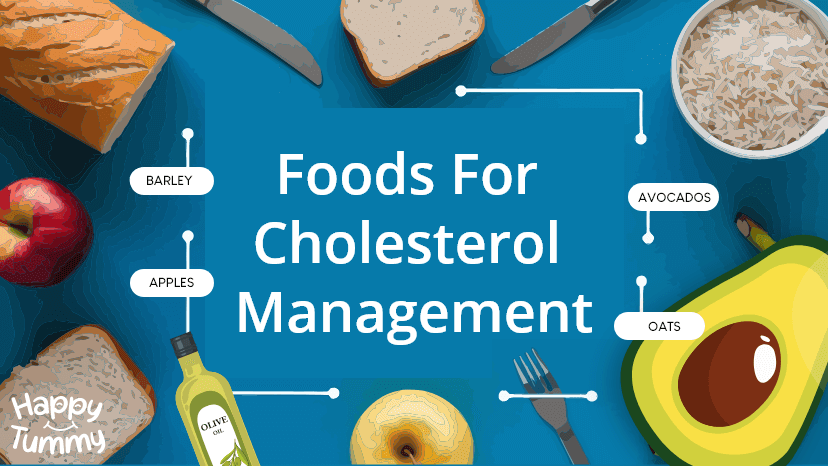Table of Contents
Whenever you hear the word cholesterol, you automatically think of an illness that is challenging to fix. Although cholesterol has a negative reputation, it is actually an element that your body requires in the proper proportions.
The issue begins when there is an excess of the wrong kind of cholesterol, such as LDL cholesterol, which can cause heart problems and blocked arteries.
The good news is that maintaining an active lifestyle, adopting healthy fats, and increasing your intake of foods high in fibre can all significantly impact cholesterol management.
Let’s start by discussing what foods help to manage cholesterol, one habit at a time.
What is Cholesterol?
Cholesterol is a lipid that does many vital functions in your body. Because lipids aren’t soluble in water, they don’t break down in your blood. Instead, they move via your bloodstream to the various areas of your body that require them.
Your body requires cholesterol, and your liver produces enough of it. However, your foods also contribute to your elevated cholesterol levels. Your body has a mechanism in place to eliminate excess cholesterol.
However, occasionally, that system becomes overloaded or performs less efficiently than it should. You may consequently have elevated blood cholesterol levels. At that point, you may encounter difficulties.
Cholesterol is not inherently harmful. It’s essential to your survival. However, excessive cholesterol might be dangerous.
Types Of Cholesterol
High-density, low-density, and very low-density lipoproteins are the three different forms of cholesterol. They are protein and fat mixtures. Each has a distinct function within the body:
- Low-density lipoprotein (LDL), commonly referred to as “bad” cholesterol, raises your risk of coronary heart disease by contributing to the accumulation of plaque (fatty deposits) in your arteries.
- High-density lipoprotein (HDL), sometimes called “good” cholesterol, can help prevent coronary heart disease.
- Very low-density lipoprotein (VLDL) carries triglycerides and contributes to the accumulation of plaque in the arteries.
Foods to Manage Cholesterol
Different foods have different effects on cholesterol management.
In the digestive tract, soluble fibre binds cholesterol and its precursors and pulls them out of the body before they enter the bloodstream.
Some provide you with polyunsaturated fats, which immediately lower LDL. Some contain stanols and plant sterols that prevent the body from absorbing cholesterol.
A person’s diet significantly impacts cholesterol levels; some foods can raise or lower cholesterol.
#1 Okra
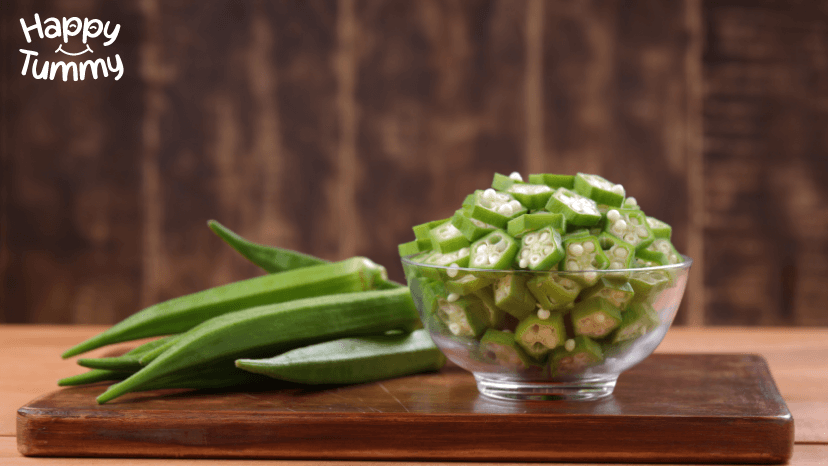
Okra, often known as lady fingers, is a warm-season vegetable that grows worldwide.
Researchers have discovered that okra contains a gel called mucilage, which may bind to cholesterol during digestion and may help manage it. This facilitates the body’s excretion of cholesterol through stool. [1]
Okra seeds are essential to the human diet because they contain many vital amino acids. They are also considered a potentially rich source of carbohydrates and vitamins, vital nutrients in a healthy diet.
#2 Apples

Pectin, a type of soluble fibre found in apples, may bind to cholesterol in the gut and stop it from entering the bloodstream.
Furthermore, apple polyphenols contain antioxidant qualities that may help manage cholesterol even more.
According to research, eating two apples daily may help manage serum cholesterol levels, especially LDL (“bad”) cholesterol. [2]
This is because apples contain fibre and polyphenols, which may manage the risk of heart disease.
One hundred grams of apple contains 2.06–2.59 grams of fibre, making it a heart-friendly fruit that may help manage cholesterol levels and promote cardiovascular health. [3]
#3 Avocados
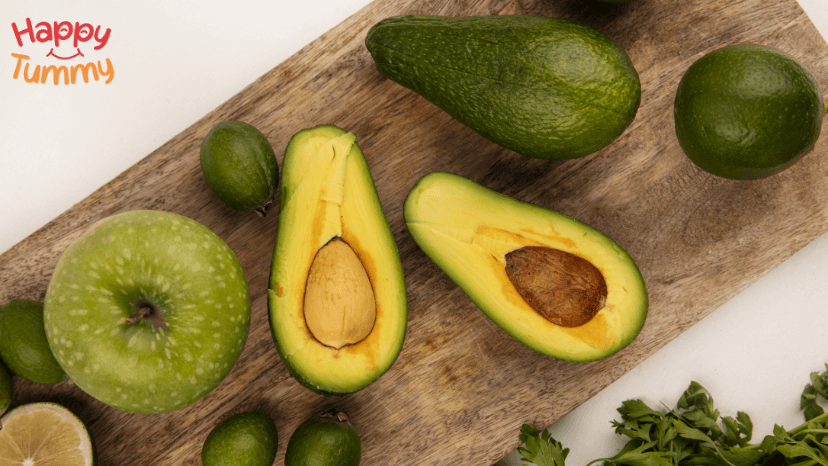
Avocados are an excellent source of monounsaturated fatty acids (MUFAs) and other nutrients.
According to research, avocado fibre may raise HDL cholesterol levels and enhance LDL cholesterol quality.
Lower your risk of heart disease by including two servings of avocado per week in a heart-healthy diet. [4]
The 100 grams of avocados contain approximately 8,710 mg of monounsaturated fatty acids (MUFA) and 1,141 mg of polyunsaturated fatty acids (PUFA), making them heart-healthy.[5]
Avocados are a heart-healthy option since they contain about 8,710 mg of monounsaturated fatty acids (MUFA) and 1,141 mg of polyunsaturated fatty acids (PUFA) per 100 grams.[8]
These beneficial fats may promote cardiovascular health by raising HDL (good cholesterol) and lowering LDL (bad cholesterol). Their high potassium and antioxidant content further enhances Avocados’ heart-healthy properties.
Try eating avocado slices as a side dish or incorporating them into salads and sandwiches. Additionally, try avocados with cucumber slices or other raw, chopped veggies.
#4 Oats And Barley
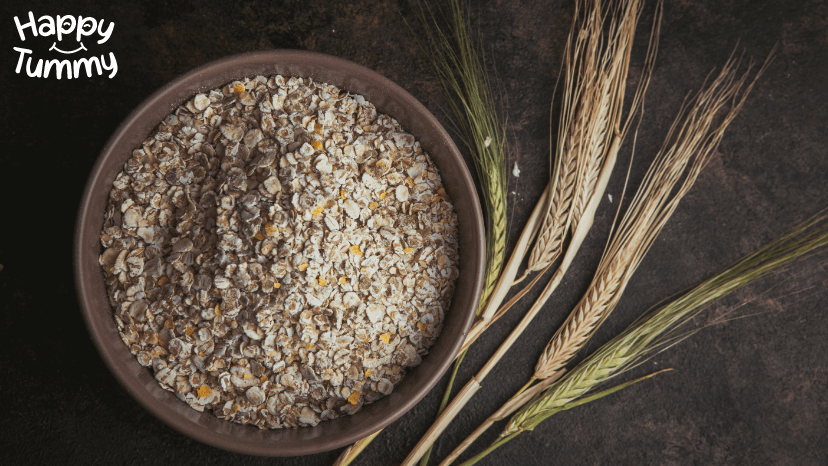
Beta-glucan is a form of fibre abundant in grains like barley and oats. As part of a balanced diet and lifestyle, consuming 3g of beta-glucan daily may help manage cholesterol. [6]
When consumed, beta-glucan produces a gel that attaches itself to bile acids in the intestines high in cholesterol. This manages the quantity of cholesterol that enters your bloodstream from the intestines. [7]
Then, to produce more bile, your liver must extract more cholesterol from your blood, which manages blood cholesterol.
Thus, beta-glucan in oats and barley is essential in managing the cholesterol.
#5 Nuts and Seeds
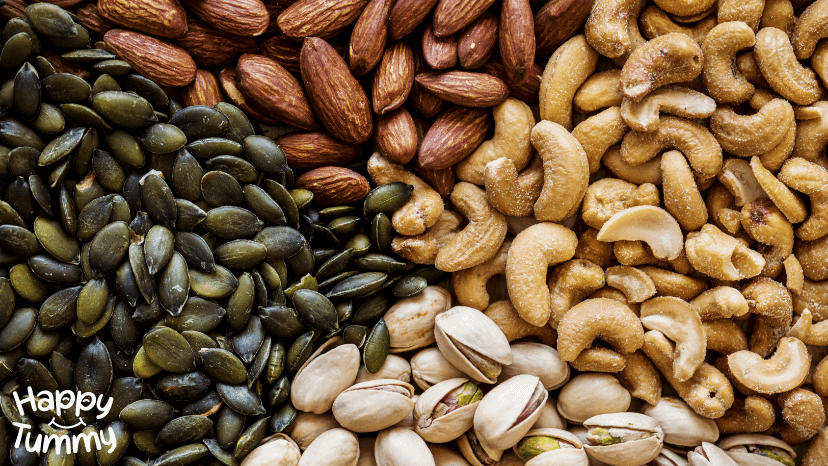
Nuts may help control your cholesterol since they are a rich source of antioxidants, unsaturated and low in saturated fats.
In addition to protein, vitamin E, potassium, magnesium, and natural plant sterols, they also include fibre, which may help prevent some cholesterol from being converted from the stomach into the bloodstream.[9]
Walnuts also contain abundant omega-3 fatty acids. This polyunsaturated fat has been associated with improved heart health, improved management of LDL cholesterol, and lessening inflammation.[10]
In addition, pumpkin, flaxseeds, sunflower, and sesame seeds are high in fibre, antioxidants, and vital elements, including zinc, magnesium, and healthy fats.
Alpha-linolenic acid (ALA), a form of omega-3 that helps regulate cholesterol, is particularly abundant in flaxseeds, while pumpkin seeds are a rich supply of plant-based omega-3 fatty acids.[11]
Nuts and seeds give a feeling of satiety, making you less prone to eat other snacks. Aim for around a handful of nuts daily. All nuts count.
Eat nuts as part of a meal or as an alternative to your typical snack. Choose ones with their skins still on them whenever you can since they are higher in nutrients. Nuts like almonds, walnuts, cashews, hazelnuts, peanuts, and pecans are all excellent choices.
#6 Fish

Fatty fish are a good source of omega-3 fatty acids, which may help manage triglycerides and blood fat. Additionally, these acids may help manage blood pressure and the danger of blood clots.
While omega-3 fatty acids have little effect on LDL cholesterol, they may help raise HDL, or good cholesterol, and manage triglycerides.[12]
Mackerel, herring, tuna, salmon, and trout have the greatest omega-3 fatty acids.
#7 Berries
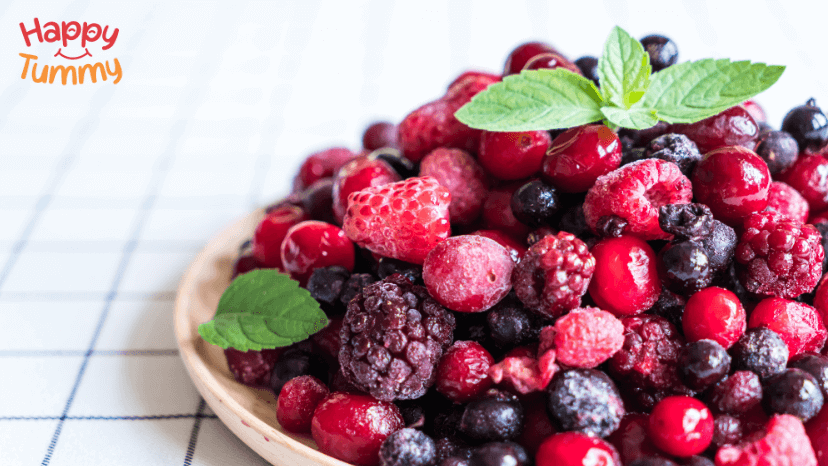
Berries are rich in antioxidants and polyphenols, especially anthocyanins, which may help manage cholesterol by lowering oxidative stress and minimising blood vessel inflammation. [13]
Consuming berries, significantly those high in anthocyanins, such as cranberries, strawberries, and blueberries, may help manage LDL (“bad”) cholesterol levels.
Because of their high fibre content and antioxidant qualities, berries have been found to have a favourable effect on lipid profiles by managing total and LDL cholesterol while perhaps raising HDL (“good”) cholesterol levels. [14]
#8 Garlic
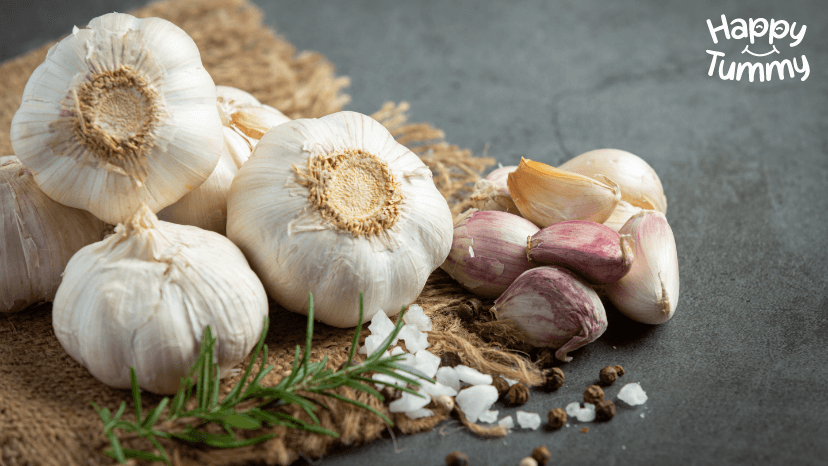
Alliin is a compound found in raw garlic bulbs. In the presence of air, alliin transforms into allicin, a sulfur-based substance that gives garlic its unique scent. Allicin is also known to manage cholesterol in the body.
According to a study, eating garlic, especially aged garlic extract, can dramatically manage total and LDL (“bad”) cholesterol levels. [15]
#9 Soy Foods
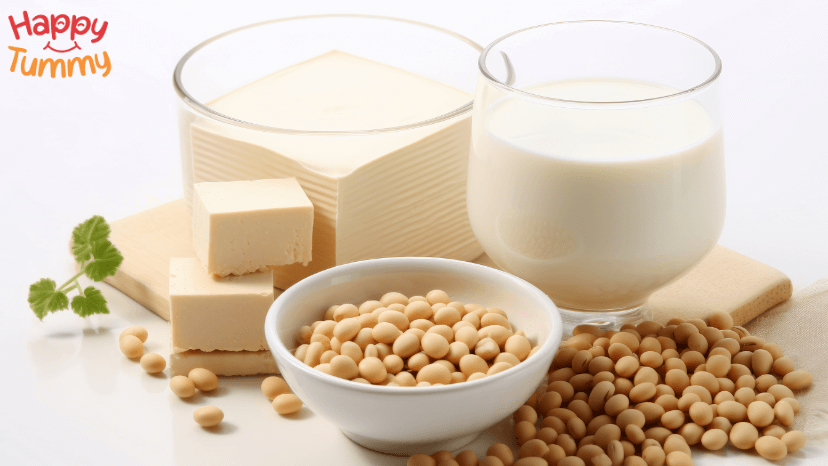
Soybeans are ideal for a diet that promotes heart health. They are low in saturated fat and high in protein, vitamins, and minerals.
According to research, eating soy protein might considerably raise HDL (good) cholesterol levels while dramatically managing triglycerides, LDL (bad) cholesterol, and total blood cholesterol levels. [16]
Soy foods can be a healthy substitute for meat, dairy products, full-fat cream, and snacks like crisps rich in saturated fat. Tofu, soy milk, veggie burgers, and protein powder are just some foods with soy ingredients.
Compared to processed soy products, whole soy products—such as soymilk, soybeans, and soy nuts—may significantly impact cholesterol levels.
#10 Olive Oil
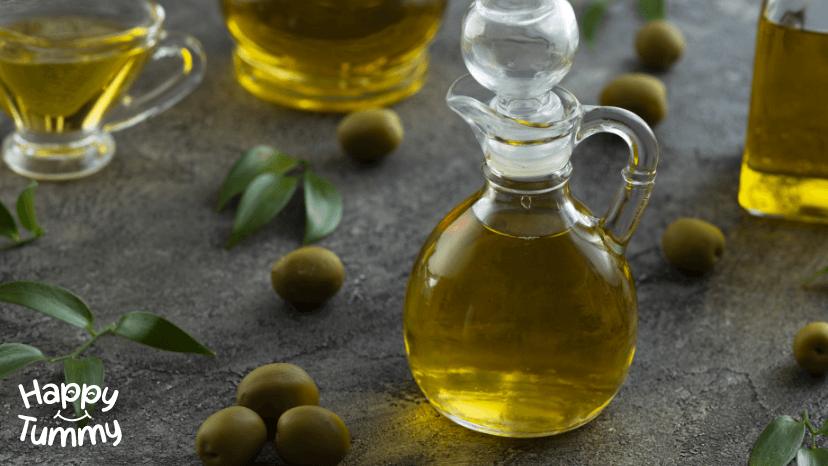
Consuming meals rich in trans and saturated fats can increase “bad” cholesterol levels.
Olive oil is one food that may help improve the “good” cholesterol and manage the “bad” cholesterol as it contains adequate amounts of omega-3 fatty acids. [17]
Try replacing other fats in your diet with olive oil. You can saute vegetables in olive oil, add it to a marinade or mix it with vinegar as a salad dressing.
Additionally, you may use olive oil as a bread dip or put it in place of butter for roasting meat.
#11 Green Leafy Vegetable
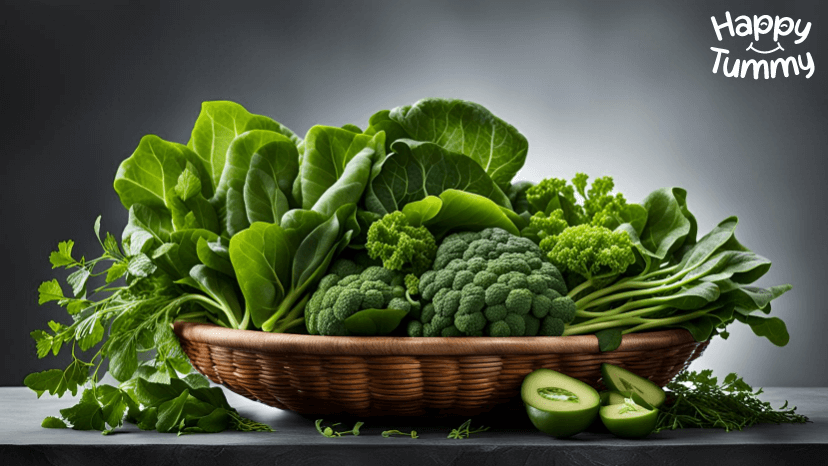
Soluble fibre, abundant in dark leafy greens like kale, spinach, and Swiss chard, may effectively manage cholesterol.
Leafy greens’ fibre may bind to cholesterol in the intestinal tract, blocking its reabsorption and managing LDL levels.
Additionally, these veggies include lutein and other carotenoids, which may have antioxidant properties that may help deal with cardiovascular disease. [18]
Because green leafy vegetables are high in vitamin K and a vital source of fibre, those on blood thinners or diets that restrict vitamin K should consult with their doctor before taking significant amounts.
#12 Millet
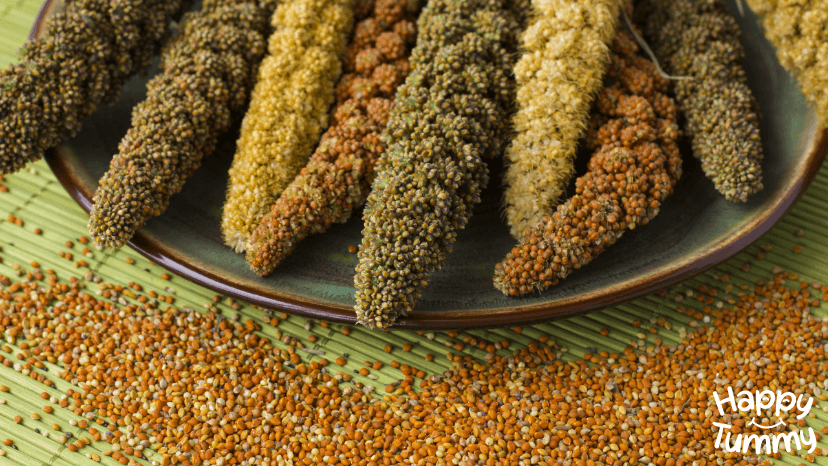
Millet is a gluten-free grain widely recognised for decreasing cholesterol and other health benefits. It includes dietary fibre called beta-glucan, which may bind to bile acids and stop the intestines from absorbing them. [19]
This may manage the amount of recycled cholesterol in the liver and improve the body’s capacity to eliminate it.
Millet also contains niacin, which may increase HDL (good) cholesterol and manage LDL (bad) cholesterol and triglyceride levels. [20]
Try incorporating pearl millet (bajra), finger millet (ragi), foxtail millet, barnyard millet, and little millet, which are high in soluble fibre, antioxidants, and healthy fats that might help lower LDL (bad cholesterol) while boosting heart health.
Aashirvaad ensures that only superior goods make it into your kitchen, and Aashirvaad Ragi Flour lives up to its legacy. This flour guarantees optimal nutrition and flavour with expert sourcing, careful processing, and clean packaging.
Reasons for High Cholesterol
High cholesterol has several reasons, such as:
- Excessive consumption of foods high in saturated and trans fats, which are harmful: These include HFSS(High fat, sugar & salt) & UPF(ultra-processed foods) sauce, cheese, mayonnaise, jam, fruit pulp, juices, carbonated beverages, biscuits, cookies, cakes, pastries, breakfast cereals, cool drinks, health drinks, packaged fruits juices etc. It also fatty meats, butter, high-fat milk, condensed ice cream, coconut oil, palm oil, most takeout and deep-fried meals, and commercially baked goods, including pies, biscuits, buns, and pastries.
- Low consumption of foods rich in dietary fibre: Consuming foods high in dietary fibre, especially soluble fibre, will lower blood levels of harmful (LDL) cholesterol. Ensure your diet includes fibre-rich foods by picking fruits, vegetables, whole grains, legumes, nuts, and seeds daily.
- Sedentary lifestyle with insufficient exercise and physical activity.
- According to WHO, being obese or overweight with excess body fat around the abdomen.
- Your family history and genetics may impact your cholesterol levels.
- Excessive alcohol use might raise your triglyceride and cholesterol levels.
- High cholesterol can result from several illnesses, such as liver and kidney problems and hypothyroidism, an underactive thyroid gland. Individuals with high blood pressure and type 2 diabetes frequently have elevated cholesterol levels. Certain medications for other medical conditions may also raise your cholesterol levels.
Consuming high-fibre foods is essential to lowering cholesterol.
Aashirvaad Atta and a group of expert nutritionists created the My Meal Plan Test to calculate your daily fibre consumption and provide a detailed meal plan that adheres to the recommended intake.
To begin, all you need to do is click the link.
Wrap Up
Cholesterol is a fat that performs vital functions in your body. Elevated cholesterol is a significant risk factor for heart disease. However, you can reduce this risk by including particular foods.
Increasing your consumption of these foods may help you maintain heart health and establish a balanced diet.
Use strategies like mindful eating to ensure you’re enjoying your meal and feeling full without going overboard.
Most importantly, you need cholesterol to survive. However, having too much cholesterol in your blood might be harmful.
Therefore, having your cholesterol evaluated and discussing the significance of your results with your healthcare professional is critical.
ITC thinks that maintaining a healthy lifestyle requires consuming a balanced diet. Call our certified nutritionist for a 45-minute consultation to receive a customised nutrition plan created specifically for you.
Frequently Asked Questions
There are no specific “cholesterol-lowering” superfoods. However, green tea, legumes and beans, and dark leafy greens are among meals that can help reduce your LDL cholesterol. A balanced diet is essential for managing cholesterol because it enables you to consume more soluble fibre, less saturated fat, and good fats from foods like fruits, vegetables, whole grains, and seafood, which substantially affect cholesterol levels.
HDL facilitates the movement of cholesterol from the arteries to the liver for metabolism and excretion. The body cannot effectively eliminate cholesterol if HDL levels are insufficient, which can cause plaque to accumulate in the arteries, making heart disease more likely.
Adequate cholesterol is critical to meet your needs, while excess cholesterol can lead to issues. Individuals with an improper lipid ratio (dyslipidaemia) or excessive cholesterol (hyperlipidaemia) are more likely to develop coronary artery disease. Total Cholesterol levels <200mg/dl are classified as Desirable, >200-≤239 mg/dl indicates Borderline high Total Cholesterol Level, and ≥240 indicates a high total cholesterol level.
Everybody ought to have an examination for effective cholesterol management. Your age and heart disease risk factors will determine how frequently you need a cholesterol test (lipid panel). Discuss with your doctor how often you should have your cholesterol tested. Understanding your numbers is essential in determining your heart disease risk.












